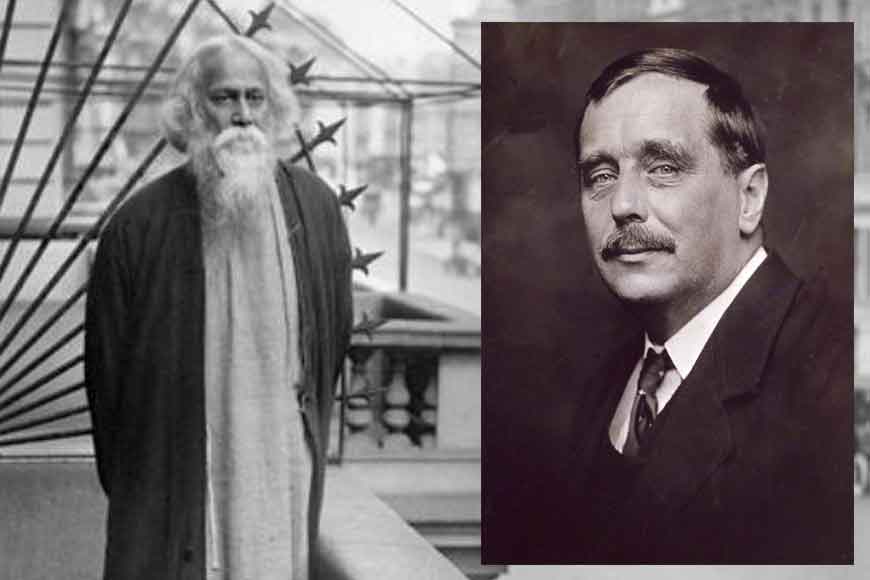Tagore and H.G. Wells

H.G. Wells and his Time Machine, not just highlighted shortcomings of human learning, but was an iconic science fiction that predicted how education in the wrong perspective can lead humans to turn robots. Wells met Nobel Laureate and great thinker, Rabindranath Tagore,in Geneva in June, 1930 and spoke on universal education, teaching, language and music. GB carries an excerpt from the same this TEACHER’s DAY:
TAGORE: The tendency in modern civilization is to make the world uniform. Calcutta, Bombay, Hong Kong, and other cities are more or less alike, wearing big masks which represent no country in particular.
WELLS: Yet, don’t you think this very fact is an indication that we are reaching out for a new world-wide human order which refuses to be localized?
TAGORE: Our individual physiognomy need not be the same. Let the mind be universal. The individual should not be sacrificed. I believe the unity of human civilization can be better maintained by linking up in fellowship and cooperation of the different civilizations of the world. Do you think there is a tendency to have one common language for humanity?
WELLS: One common language will probably be forced upon mankind whether we like it or not.
TAGORE: I quite agree. The time for five-mile dialects is fast vanishing. Rapid communication makes for a common language. Yet, this common language would probably not exclude national languages.
WELLS: Today we are elaborating and perfecting physical methods of transmitting words. Translation is a bother. Take your poems – do they not lose much by that process? If you had a method of making them intelligible to all people at the same time, it would be really wonderful.
TAGORE: Music of different nations has a common psychological foundation, and yet that does not mean that national music should not exist. The same thing is, in my opinion, probably true for literature.
WELLS: Modern music is going from one country to another without loss – from Purcell to Bach, then Brahms, then Russian music, then oriental. Music is of all things in the world most international.
TAGORE: Physical science of the nineteenth century probably has created this spirit of race superiority in the West. When the East assimilates this physical science, the tide may turn and take a normal course.
WELLS: Modern science is not exactly European. A series of accidents and peculiar circumstances prevented some of the eastern countries from applying the discoveries made by humanists in other parts of the world. They themselves had once originated and developed a great many of the sciences that were later taken up by the West and given greater perfection. Today, Japanese, Chinese and Indian names in the world of science are gaining due recognition.
TAGORE: And then, the channels of education have become dry river beds, the current of our resources having been systematically been diverted along other directions.
WELLS: I am also a member of a subject race. I am taxed enormously. I have to send my check – so much for military aviation, so much for the diplomatic machinery of the government! You see, we suffer from the same evils. In India, the tradition of officialdom is, of course, more unnatural and has been going on for a long time. The Moguls, before the English came, seem to have been as indiscriminate as our own people.
TAGORE: And yet, there is a difference! The Mogul government was not scientifically efficient and mechanical to a degree. The Moguls wanted money, and so long as they could live in luxury they did not wish to interfere with the progressive village communities in India. The Muslim emperors did not dictate terms and force the hands of Indian educators and villagers. Now, for instance, the ancient educational systems of India are completely disorganized, and all indigenous educational effort has to depend on official recognition.
WELLS: Recognition by the state, and good-bye to education!
(Source: School of Wisdom)








